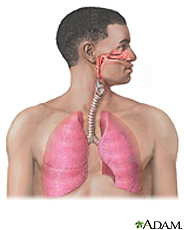 |
 |
 |
||
    |
||||
|
||||
|
Other Health Topics:
Tuberculosis
Also called: TB
Tuberculosis (TB) is a bacterial infection caused by a germ called Mycobacterium tuberculosis. The bacteria usually attack the lungs, but they can also damage other parts of the body. TB spreads through the air when a person with TB of the lungs or throat coughs, sneezes or talks. If you have been exposed, you should go to your doctor for tests. You are more likely to get TB if you have a weak immune system. Symptoms of TB in the lungs may include
If not treated properly, TB can be deadly. You can usually cure active TB by taking several medicines for a long period of time. People with latent TB can take medicine so that they do not develop active TB. Centers for Disease Control and Prevention
Start Here
|
| Home | Health Topics | Drugs & Supplements | Encyclopedia | Dictionary | News | Directories | Other Resources | |
| Disclaimers | Copyright | Privacy | Accessibility | Quality Guidelines U.S. National Library of Medicine, 8600 Rockville Pike, Bethesda, MD 20894 National Institutes of Health | Department of Health & Human Services |
Date last updated: 20 April 2009 Topic last reviewed: 08 December 2008 |


